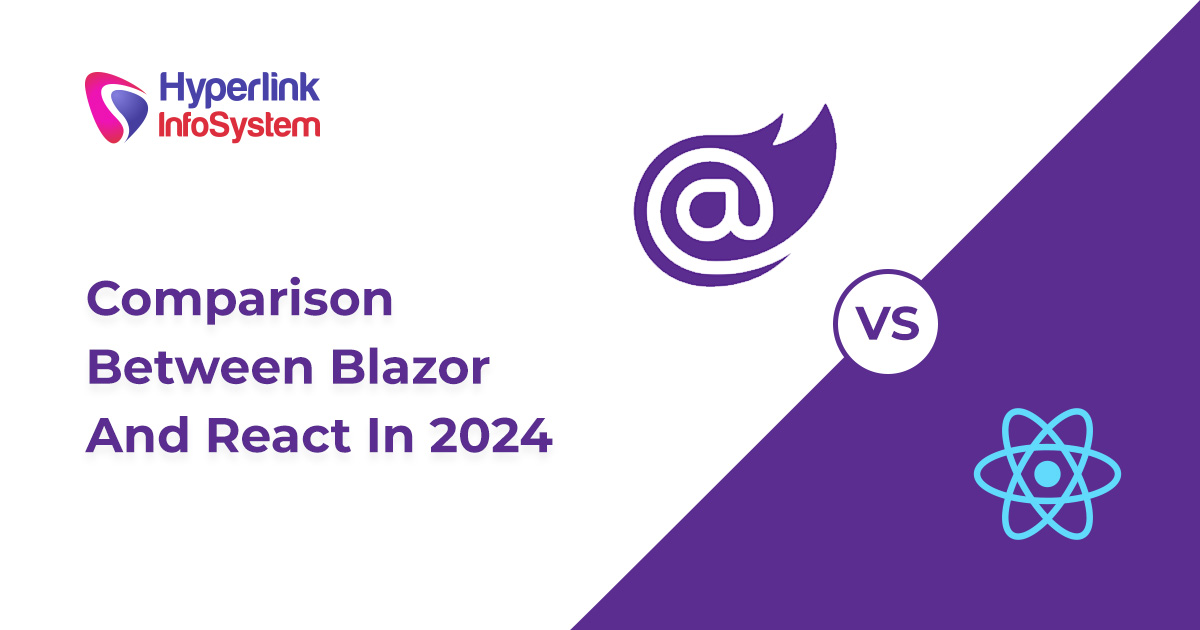The article compares Blazor and React, two popular web development frameworks for building interactive and dynamic web applications. Blazor is developed by Microsoft and uses C# instead of Javascript, while React is an efficient Javascript library developed by Facebook. Both are suitable for building UI and UI components, but Blazor has the benefit of handling complicated business logic on the server, resulting in improved performance.
React uses a virtual DOM to optimize rendering and improve performance, while Blazor uses server-side architecture to reduce load on the client's browser.
React is widely used for building single-page applications where components can be updated dynamically based on user interactions.
From business magnets to teeny-tiny businesses, everyone uses their website. The website of a business has a significant impact on the sales of the business. Website will make your business easier but building a website is a tough nut to crack.
Web development has evolved significantly, with numerous
web development frameworks and technologies available to developers. Blazor and React are two popular choices for building interactive and dynamic web applications. In this detailed comparison, we'll delve into the key aspects of both Blazor and React, exploring their architecture, development model, performance, and community support. In this article, you will learn about which will suit you best whether Blazor or React for your web development.
Blazor Introduction
Blazor web framework developed by Microsoft to build engaging websites using C#. it uses NET instead of Javascript. It uses WebAssembly to run C# code in the browser, providing a full stack. Blazor comes into existence after React and embraces all the standard requirements.
React Introduction
React is developed by Facebook and it builds websites using javascript. React is the efficient Javascript library, that helps to build UI and UI components. As React uses JavaScript as its coding language, it is much easier for web developers as it is the most familiar language to them. According to Statista react is used by 40.58% of users.
When Facebook introduced React, there were other technologies were available. At that time coding required a lot of effort. But the presence of react made coding simpler than before. Other frameworks are required to write a lot of re-writing codes. React helped coders to complete their work at a quicker pace and break down the complex components.
This created a separate place for reaction among the website developers. React is extensively used for creating single-page applications with dynamically updated components based on user interactions.
It uses a virtual DOM to optimize rendering and improve performance. Hire web developers to create your website and get your work done without even lifting your finger.
A Comprehensive Comparison Between Blazor and React
As the web development process is complex, this article provides a comprehensive comparison between the two frameworks, exploring their key aspects such as architecture, development model, performance, and community support. Ultimately, the decision to choose between Blazor or React depends on the individual developer's expertise and needs.
1) Architecture
To handle complex issues Blazor uses server-side architecture. In this architecture, UI has to be rendered on the server and then sent to the customer’s browser as HTML. This helps to reduce the load on the customer’s browser. The server-side Blazor creates a connection between the client and the server. This allows for real-time communication.
React is a client-side library. React uses Javascript to render the UI on the customer’s browser. To minimize the updates required to the actual DOM, react uses virtual DOM. This will result in better performance. A skilled web development company can provide you with the services you wish.
2) Language
Blazor prefers .NET and C# to craft your web applications. C# is considered a robust language with effective safety features. On the other hand, React uses Java Script which is a wide range of ecosystem of libraries and tools.
3) Learning Curve
If you are knowledgeable about C# and .NET, you can go with Blazor. If you are familiar with Javascript, React would be much better for you. Choose wisely as it has a huge role to play. Hire web developers to create your website and make your website grow.
4) Performance
Blazor has the benefit of handling complicated business logic on the server, which results in improved performance. The server-side Blazor, on the other hand, has a larger latency due to the server and client roundtrip. Client-side Blazor provides better latency but is slower owing to the overhead of loading the.NET runtime in the browser.
React is quick and efficient because it employs a virtual DOM, which reduces the number of modifications to the actual DOM. React also has a smaller footprint than Blazor, which allows for speedier loading in the client's browser.
5) Component Model
Blazor’s component-based architecture is likely to react. In this developers can create reusable UI components. Developers, who have experience with ASP.NET would be familiar with Blazor’s components as it is written in C# AND Razor syntax.
React’s reusable components with JSX Syntax let the developers express their UI in a more precise manner. Developers can also use JavaScript and JSX to write react components.
To get your website as you desire, put it in the hands of
skilled web developers. Though hiring we developers may cost you an arm and leg, there are talented web development companies still available in the market.
Conclusion
In conclusion, both Blazor and React have their strengths and are suitable for different scenarios. Blazor, with its use of C# and .NET, offers a full-stack development experience, allowing developers to use a single language across the client and server. React, with its established position in the front-end development space, excels in performance and has a vast and mature ecosystem.
The choice between Blazor and React depends on various factors, including the development team's expertise, project requirements, and existing technology stack. Blazor would be comfortable for those who know C# and.NET. But if you want to go for a performance-optimized and well-established front-end library, react would be the suit for you.
Ultimately, the decision should be based on a careful evaluation of the specific needs of the project, considering factors such as language preference, performance particular needs, and community support. Both Blazor and React have their merits, and the right choice depends on the context of the
full-stack development project.


















